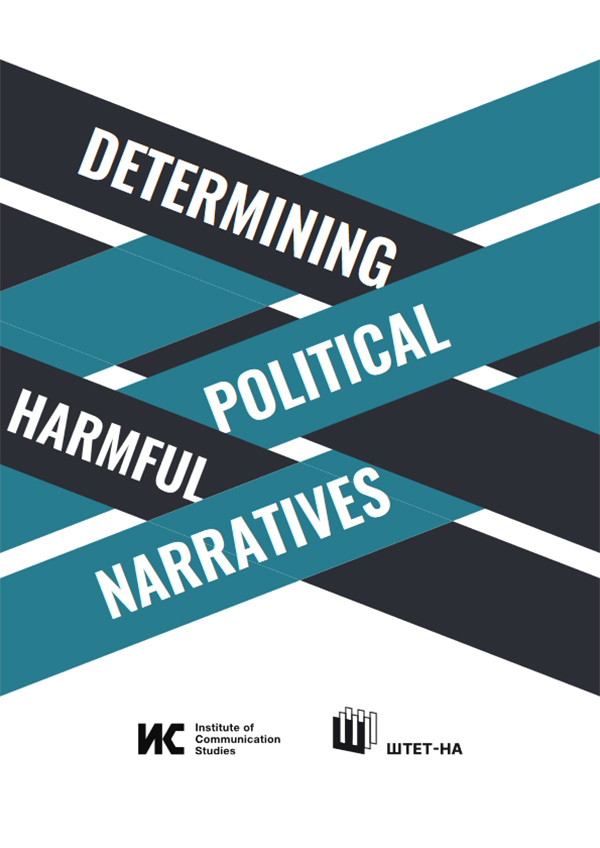
Determining Harmful Political Narratives: Monthly Report
Period: May 2024
Summary
Full report
The Institute of Communication Studies (ICS) published the seventh and last one-month report within the research Determining Political Harmful Narratives (HARM-TIVE), which represents a sublimation of the data from the monitoring of the communication practices of the political actors in which harmful narratives are identified and their reporting in the media in May 2024. Regarding the May report it is specific that the monitoring was carried out during the last days of the election campaign for the second round of the presidential elections and for the parliamentary elections that were held concomitantly on 8 May, as well as during the post-election period when the results of the voting were presented and the negotiations regarding new government composition were already underway.
In May, 115 posts with harmful narratives were recorded on the Facebook pages of the political parties and their leaders, which is a decrease compared to the previous two months (142 posts in March and 176 posts in April). This trend was also reflected in the media reporting, where there was also a drop in the number of posts with harmful rhetoric. In the news editions of the TV stations this month, 51 news items with harmful content were recorded, which is a record decrease (55 ‘harmful news items’ in April and 79 in March). The situation is similar with the online media, where 187 posts with harmful narratives were recorded, which is a noticeable decrease compared to the previous period (261 posts with harmful narratives in April, and 224 in March).
In contrast to the previous months, when the VMRO-DPMNE was the party with the most harmful narratives consistently identified, this month that primacy was taken over by the Levica with the most harmful narratives (25), which is still a slight decrease compared to the previous period (27 in March and 38 posts with harmful narratives in April). The VMRO-DPMNE dropped to the second place with 16 ‘harmful’ posts (March and April each with 43 harmful posts, respectively). It is interesting that for the first time since the beginning of the monitoring, i.e., in the months from September 2023 onwards, in May this year, the SDSM was not among the first three parties with the most harmful narratives, which is due to the silence of this party after the announcement of the election results. The SDSM with five posts with harmful narratives (29 in March and in April each, respectively) took the fourth place and gave way to the third place to the DUI, which had six posts with harmful narratives (9 in March and 14 harmful posts in April).
Pertaining to the individuals, i.e. the party leaders and the government officials, this month the most harmful narratives were found on the Levica’ leader, Dimitar Apasiev’s Facebook page (16), which is a significant increase compared to the previous two months (9 in March and 7 harmful posts in April). One harmful narrative was also identified at the leader Hristijan Mickoski, and none at the SDSM’s leader Dimitar Kovachevski. Kreshnik Bekteshi led the list of harmful posts among the DUI representatives with 10 such posts, which is a noticeable increase compared to the previous month (2 harmful posts in April), followed by Artan Grubi (5) and Ali Ahmeti (3). An increase in the number of posts with a harmful narrative can be observed among one of the key spokespersons of the Alliance for the Albanians, the Minister of Justice Krenar Loga (from 3 posts with a harmful narrative in April to 10 in May).
Among the online media, the harmful narratives were mostly posted through the Kurir portal (28 news items), which, months ago had the largest number of news items with harmful narratives, followed by Vecer.mk (26), Nezavisen (22) and Tetova Sot (22), which in the past period, occasionally changed their place on the scale or were replaced by others (Republika, A1on). Among the TV stations, TV Alfa is again the medium with the highest number of news items with harmful narratives (12), but unlike February (40) and March (35), in April and May this TV station also had a significant reduction of this type of news items. Following Alfa, Alsat M and TV 21 are the next (8 news items each), then TV 24 (7) and TV Telma (5).
Three most common harmful narratives among the political actors, as in the previous months, are ‘biased selection’, ‘undermining trust in the institutions’ and ‘character attacks’. The distribution of the top two places is the same for online media and the TV stations, with the third most common harmful narrative in both types of media being ‘fomenting divisions.’ This month, as well, posts with ‘extreme patriotism and nationalism’, ‘ethnocentrism’, ‘spreading panic and fear’ and individual cases of ‘hate speech’ can be observed.
In May, as in the previous months, the Facebook profiles of the Ministers in the Government who were simultaneously candidates in the election process were actively used to promote their activities within the campaign, thus abusing the official government communication channels for personal promotion and for party needs.
Contact:

